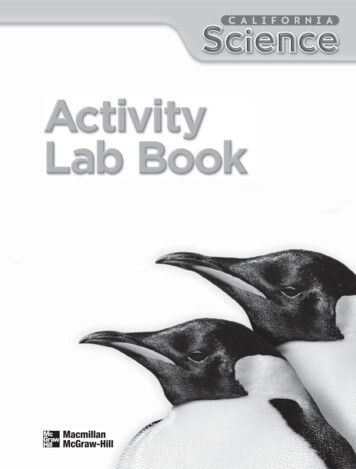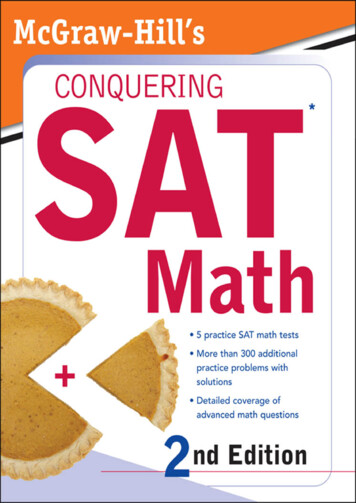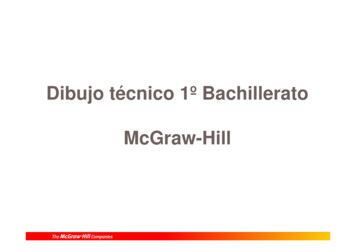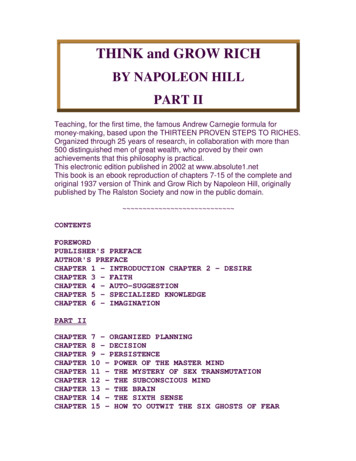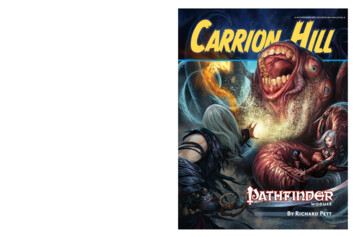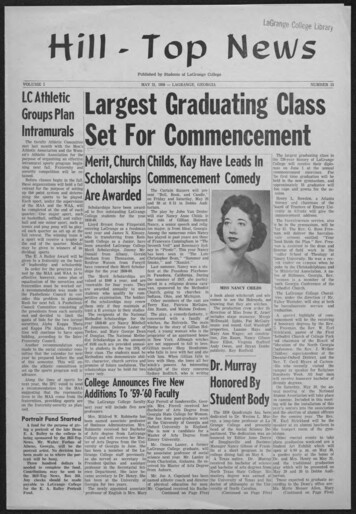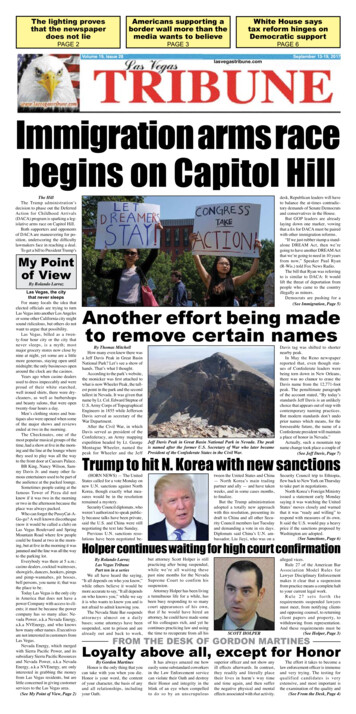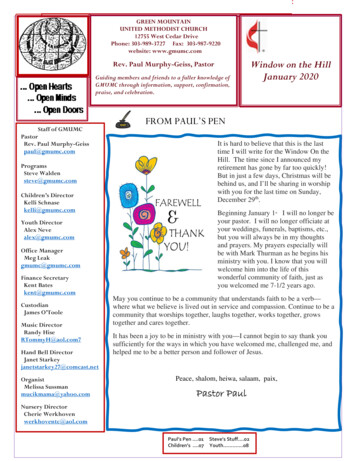
Transcription
McGRAW-HILL READINGGrammarGrade 4Practice Book
LEARNNameDateGrammar1Sentences A sentence is a group of words that expresses a complete thought. A sentence fragment is a group of words that does not express a completethought. Every sentence begins with a capital letter. A statement is a sentence that tells something. It ends with a period. A question is a sentence that asks something. It ends with a question mark.Decide if each group of words makes a sentence. If it does, rewrite thesentence adding a capital letter and a period or a question mark.1. it was too hot outside2. dad and Luke left in the morning3. when they hiked to Lost Lake4. dad went up the trailMcGraw-Hill School Division5. a mountain that no one else knew about6. did they find a new "lost lake"6Book 4 / Unit 1The Lost LakeExtension: Have students write two statements andtwo questions about an outdoor adventure.1
LEARN & PRACTICENameDateGrammar2Types of Sentences A statement is a sentence that tells something. It ends with a period. A question is a sentence that asks something. It ends with a question mark. A command tells or asks someone to do something. It ends with a period. An exclamation shows strong feeling. It ends with an exclamation mark.Write statement if the sentence tells something. Write question if thesentence asks something. Write command if the sentence tells or askssomeone to do something. Write exclamation if the sentence showsstrong feeling. Then put the correct end mark at the end of each sentence.1. Dad and Luke hiked to Lost Lake2. What did they find when they got there3. Put your pack on and let’s go4. Luke wanted to camp by the creekMcGraw-Hill School Division5. Look out for bears6. How did they find their special lake2Extension: Have students think of a special place. Then havethem write a statement, a question, a command, and anexclamation about it.Book 4 / Unit 1The Lost Lake6
PRACTICE AND REVIEWNameDateGrammar3Write SentencesRewrite each sentence. Correct the sentence capitalization andpunctuation.1. have you ever hiked in the mountains.2. try to imagine what it would be like?3. wouldn’t it be great to sleep outdoors.4. put on your hiking boots?5. let’s hit the trail?6. we can reach the lake by nightfall7. shall we make camp on the shore.McGraw-Hill School Division8. i love the water.8Book 4 / Unit 1The Lost LakeExtension: Have pairs of students choose a subjectand take turns making up sentences about it. Aftereach sentence, the student who is listening tellswhat kind of sentence it is.3
MECHANICSNameGrammarDate4Using Capital Letters and End Marks Every sentence begins with a capital letter. A statement ends with a period. A question ends with a question mark. A command ends with a period. An exclamation ends with an exclamation mark.Correct each sentence by changing any incorrect lower case letters tocapital letters and by adding the correct end mark. Use the line providedfor your answers.1. the lake was high in the mountainsT.2. how long did it take them to find itH?3. it wasn’t the lake Dad remembered4. it was too crowdedI!D!5. dad would never stay there7. why was he different in the mountains8. recall the things he did4McGraw-Hill School Division6. they kept hiking until they found a special placeW?R.Extension: Have pairs of students look through booksand magazines for examples of statements,questions, commands, and exclamations and copy anexample of each.Book 4 / Unit 1The Lost Lake8
TESTNameDateGrammar5Kinds of SentencesA. Decide if the sentence is a statement, a question, a command, or anexclamation. Write what type of sentence it is, and add the correct endmark on the line.1. Luke was staying with his Dad2. What did he do all day3. Think about hiking4. Where would you like to go5. That sounds wonderfulB. Add the correct punctuation to each of these sentences.6. I’ll take a hiking trip in the mountains7. You wake up and discover a lake8. Do you think that would be excitingMcGraw-Hill School Division9. I’d love to discover a lake10. Could I name it after myself10Book 4 / Unit 1The Lost Lake5
MORE PRACTICENameDateGrammar6Sentences and Punctuation Marks A statement is a sentence that tells something. A question is a sentence that asks something. A command tells or asks someone to do something. An exclamation shows strong feeling.Mechanics Begin every sentence with a capital letter. A statement ends with a period. A question ends with a question mark. A command ends with a period. An exclamation ends with an exclamation mark.Write each sentence correctly.1. why did we wake up early2. we are going camping3. it was a long hike to the lakeMcGraw-Hill School Division4. we found it5. were there many people6Book 4 / Unit 1The Lost Lake5
LEARNNameDateGrammar7Sentence SubjectsRemind students that the subject of a sentence tells whom or what thesentence is about. The complete subject includes all the words in the subject. The simple subject is the main word in the complete subject. It tells exactlywhom or what the sentence is about. You can sometimes correct a sentence fragment by adding a subject.Turn these sentence fragments into complete sentences by adding asubject.1. Led to hard work2. Had to work too hard3. Wanted a place to come home to4. Found an accidental road5. Led through a meadowMcGraw-Hill School Division6. Stood at the end of the road7. Gave name tags to everyone8. Was full of “Amelia-things”8Book 4 / Unit 1Amelia’s RoadExtension: Ask students to write sentences. Thenhave them exchange sentences with a partner andunderline all the words that make up the subject.7
LEARN AND PRACTICENameDateGrammar8Sentence PredicatesRemind students that the predicate of a sentence tells what the subjectdoes or is. The complete predicate includes all the words in the predicate. The simple predicate is the main word in the complete predicate. It tellsexactly what the subject does or is. You can sometimes correct a sentence fragment by adding a predicate.Turn these fragments into complete sentences by adding a predicate.1. Everyone in Amelia’s family2. All the apples3. A white house with blue shutters4. An old shade treeMcGraw-Hill School Division5. Amelia’s accidental road6. All the new children in class8Extension: Ask students to write sentences. Then havethem exchange sentences with a partner andunderline all the words that make up the predicate.Book 4 / Unit 1Amelia’s Road6
PRACTICE AND REVIEWNameDateGrammar9Write Complete Sentences The subject of a sentence tells whom or what the sentence is about. The predicate of a sentence tells what the subject does or is.Complete each sentence fragment. Then tell if you added a subject or apredicate.1. Amelia and her family2. Still felt sleepy3. Drew a picture of a pretty white house4. Everybody in the class5. Danced for joy in the quiet meadowMcGraw-Hill School Division6. A narrow, rocky footpath6Book 4 / Unit 1Amelia’s RoadExtension: Have students write the subject of asentence and have a partner add a predicate tocomplete the sentence.9
MECHANICSNameDateGrammar 10Sentence Punctuation A sentence begins with a capital letter. Sentences that make statements end with periods.Read each group of words. If the words are a complete sentence, write acapital letter at the beginning and put a period at the end.1. roads that led to strange places2. they pick peaches in June3. a neat white house with blue shutters4. the family followed the harvest5. now they picked apples6. her teacher never learned her nameMcGraw-Hill School Division7. a rocky path through the meadow8. the old metal box was dented10Extension: Have pairs of students take turns writinggroups of words. The other partner must decide if thewords are a sentence or a sentence fragment. If thewords are a sentence fragment, the partner shouldadd a subject or a predicate to complete thesentence.Book 4 / Unit 1Amelia’s Road8
TESTNameDateGrammar 11Complete the SentencesCircle the letter of the words that make each fragment a complete sentence.1. drew a picture of a white housea with blue shuttersa had a tree in the yardb Ameliab someplace neat and tidyc with a yardc anywhere in the worldd in schoold something special2. Mrs. Ramosa had to be carefulb her teacher last yearb The ripe fruitc at schoolc grabbed an appled welcomed the new childrend was ready to be picked7. led from the highway to the treea Amelia’s whole familya was a shortcutb picking applesb through the meadowc before school startedc The narrow pathd still sleepyd went down a gentle hill4. The accidental roadMcGraw-Hill School Division6. could be easily bruiseda Amelia’s teacher3. got up at dawn85. Amelia’s dream house8. The farm workersa a sturdy, old treea the apple harvestb was rocky and narrowb were ready to move onc through a meadowc one more tripd a shortcut to campd sun-drenched fieldsBook 4 / Unit 1Amelia’s Road11
MORE PRACTICENameDateGrammar 12Subjects and Predicates The subject of a sentence tells whom or what the sentence is about. The predicate tells what the subject does or is.Draw a line between the subject and the predicate in the following sentences.1. Farm workers follow the crops.2. Maps meant moving on to Amelia.3. Amelia and her family pick apples.4. They started working at dawn.5. Mrs. Ramos gave Amelia’s picture a red star.6. Amelia’s experiences at school made her happy.7. The accidental road went through a meadow.8. Amelia’s special place was at the end of the road.9. She buried her treasure box under the tree.McGraw-Hill School Division10. A hair ribbon, her name tag, and her picture were in the box.12Book 4 / Unit 1Amelia’s Road10
LEARNNameDateGrammar 13Compound Sentences A conjunction joins words or groups of words. And, but, and or areconjunctions. Two related sentences can be joined with a comma and and,but, or or. A sentence that contains two sentences joined by and, but, or or is called acompound sentence.Add a comma and and, but, or or, and combine each pair of sentences intoone compound sentence.1. The children laughed. The dogs barked.2. The chickens were not hungry. They still continued to eat.3. Get the animals in the barn. They’ll be lost in the storm.Get the animals in the barn, or they’ll be lost in the storm.4. Sarah had never driven a wagon. She was determined to learn.5. Caleb looked frightened. Anna covered her ears.6. They were afraid Sarah would leave. She came back.McGraw-Hill School Division7. Sarah missed the sea. She would miss the family more.8. Caleb couldn’t be pesky. Sarah would leave.8Grade 4/Unit 1Sarah, Plain and TallExtension: Have students write their own example ofa compound sentence.13
LEARN AND PRACTICENameDateGrammar 14Compound Subjects and Predicates You can combine two sentences by joining two subjects or two predicateswith and or or. A compound subject contains two or more simple subjects that have thesame predicate. A compound predicate contains two or more simple predicates that havethe same subject.Combine each pair of sentences to form one sentence using a compoundsubject or a compound predicate.1. Papa could teach Sarah to drive the wagon. Caleb could, too.2. The dogs barked. They ran out to meet the wagon.3. The storm scattered the roses. It knocked over a tree.4. Papa plowed the field. Sarah plowed the field.5. Sarah had lived in Maine. She loved the sea.McGraw-Hill School Division6. Seal ignored the storm. Sarah’s chickens ignored the storm.7. Rose had a flower name. Violet had a flower name.8. Sarah drove to town. Sarah brought back presents.14Extension: Have students write two sentences for apartner to combine into a sentence with a compoundsubject or predicate.Grade 4/Unit 1Sarah, Plain and Tall8
PRACTICE AND REVIEWNameDateGrammar 15Write SentencesAdd and, but, or or to combine each pair of sentences into one sentencethat is a compound sentence or has a compound subject or predicate.1. Anna wanted Sarah to stay. Caleb wanted Sarah to stay.2. Sarah kissed everyone good-bye. Sarah drove away.3. Sarah ran out into the storm. Papa followed her.4. Thunder pounded. Lightning crackled.5. Seal curled up in my lap. Seal went to sleep.6. Sarah was just going shopping. The children did not know that.7. Nick jumped into the wagon. Nick sat beside Sarah.McGraw-Hill School Division8. Papa will drive the wagon. Sarah will drive the wagon.8Grade 4/Unit 1Sarah, Plain and TallExtension: Have students write two sentences for apartner to combine into a sentence with acompound subject or predicate.15
MECHANICSNameDateGrammar 16Punctuating Compound Sentences Use a comma before and, but, or or when you join two sentences to form acompound sentence. Begin every sentence with a capital letter. The second part of a compound sentence should not begin with a capitalletter.Correct each sentence. Write commas and capital letters where they areneeded.1. Papa gave Sarah daisies and she put them in her hair.2. the neighbors came to help and Maggie brought plants.3. the women planted flowers and the men plowed the fields.4. Sarah came by train and we went to meet her.5. the sky was dark green and the air was still.6. the work was done and the men came in from the field.McGraw-Hill School Division7. Sarah will stay and there will be a wedding.8. Sarah brought candles and they ate by candlelight.16Extension: Have pairs of students look through booksand magazines to find examples of compoundsentences. Have students copy one example andthen rewrite it as two sentences.Grade 4/Unit 1Sarah, Plain and Tall8
TESTNameDateGrammar 17Sentence CombiningA. Add a comma and and to turn each pair of sentences into a compoundsentence.1. The wind howled. The dogs started to bark.2. The rain stopped. The sun came out.3. The whistle sounded. The train pulled into the station.4. Nick sat beside Anna. Seal crawled into her lap.B. Combine each pair of sentences by joining their subjects or predicateswith and.5. Anna wanted Sarah to stay. Caleb wanted Sarah
Found an accidental road 5. Led through a meadow 6. Stood at the end of the road 7. Gave name tags to everyone 8. Was full of “Amelia-things” 8 Extension: Ask students to write sentences. Then have them exchange sentences with a partner and underline all the words that make up the subject. Book 4 / Unit 1 Amelia’s Road 7 Name Date Grammar 7 LEARNFile Size: 1MBPage Count: 195
